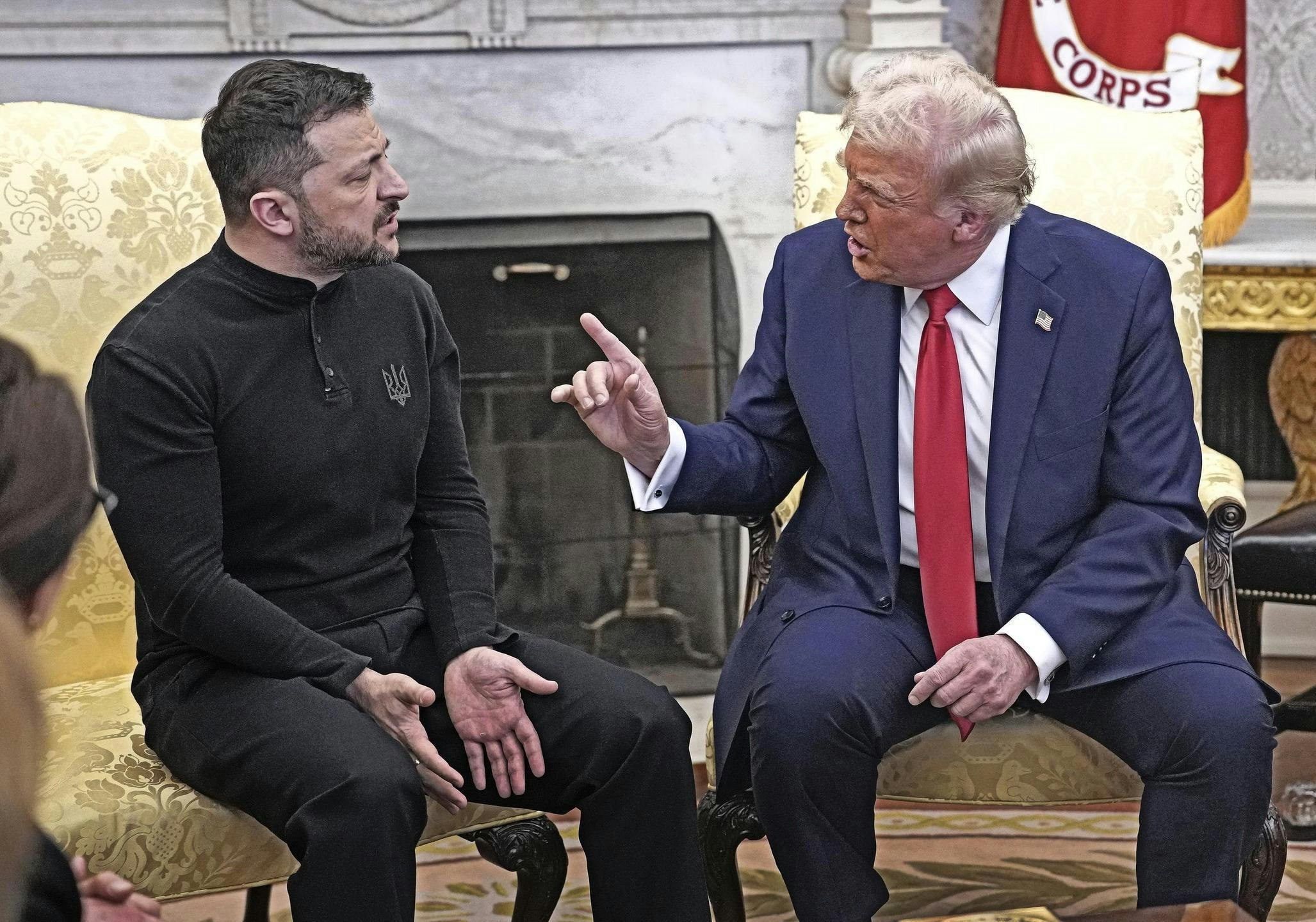This article is taken from the May 2025 issue of The Critic. To get the full magazine why not subscribe? Right now we’re offering five issues for just £10.
What are we, on this side of the Atlantic, really willing to do for Ukraine? Now that America’s role is doubtful and Russia’s aggression persists, the question is more urgent. It is past time for Britain and Europe to get real with Ukraine, and with ourselves, about what we are prepared to bleed for. Instead, prime minister Sir Keir Starmer offers a noble but ill-conceived vision for European protection of Ukraine that does not bear scrutiny. In attempting to counter future Russian aggression, it runs up against another formidable adversary: reality.
To keep and enforce the peace, Starmer proposes to deploy a Western security force on the ground and in the air of the invaded country, spearheaded by Britain and France. The exact mission is not yet clear, ranging from a “tripwire” force of 10-20,000 troops to a larger “reassurance” force of 30–40,000 troops.
Britain’s land contribution would be at least a brigade in theatre along with supporting enablers, plus forces in training and recovering. RUSI analyst Ed Arnold estimates this will require 20 per cent of total British Army strength and approximately 50 per cent of the Field Army, tying down Britain’s combat power, along with air and naval forces. The rationale for this major bet is that the military presence will both deter Russia from further military adventurism and bolster Ukraine’s defences.
As Starmer tells it, for there to be peace, Russia must cease its barbaric assaults. So far, so good. But the aims then become more expansive. The war in Ukraine must end only on terms that guarantee the country’s sovereign “integrity” and which restore justice. Russia must return abducted children. Its regime must be “held to account”.
These are not peace-settlement conditions, which require compromise, but uncompromising victory conditions without victory. Russia must then acquiesce to an international security force present for “years” in a neighbouring country it has tried to dominate. The arrangement will require American participation as a “backstop”. Ukraine’s future, Starmer insists, is “vital” to Britain’s “national security”.
Let us take his proposal at face value and judge it on its merits. There are three realities that doom Starmer’s proposal. America won’t support it. Russia will oppose it. Were Russia to test it, the Western nations fielding forces are more likely either to back off or get into an escalating conflict beyond their limited political will. If these things are true, we should take them into account.
★
First, Britain can’t bank on American support. There is every sign that President Trump may abandon Ukraine to its fate. Trump engages Russia in an emerging bilateral partnership. He sidelines and maligns Volodymyr Zelenskyy and coerces Kyiv by suspending US intelligence and aid. From performative public humiliation in the Oval Office, to threats to annex or absorb allied territory from Canada to Greenland, to open disdain for European military forces, to indiscreet Signal chats about allies, to proposals to asset-strip Ukraine as the price of US engagement, Trump and his court signal hostility to Kyiv and to Europe in general.

At best, the Trumpians believe that securing Ukraine is largely or wholly Europe’s duty, part of an accelerated burden shift of defence effort. At worst, they see Ukraine by turns as a waste of resources, a potential treasure trove of wealth to be exploited and a bargaining chip to split the Sino-Russian axis. That being so, Washington is unlikely to back a Western coalition standing sentry in Ukraine and even less likely to contribute to it. Presently, Europe relies on enablers supplied by the US, from satellite reconnaissance and intelligence to airlift, air-to-air refuelling and troop transport.
Second, Russia will oppose the arrangement. The debate about why precisely Vladimir Putin invaded in February 2022 can rage on. But whether Russia fell on Ukraine primarily to neutralise it and seek security or primarily as a greedy predator seeking imperial aggrandisement or regime legitimation, the same conclusion suggests itself. Russia has not sunk heavy costs for Ukraine to become a Western base of any kind.
There may or may not be an eventual bargaining space to be reached between Russia, Ukraine and Europe, as a hurting stalemate leads to some kind of demilitarised zone and armed neutrality. Given the difficulty of even agreeing a partial ceasefire, getting there may take more attrition over more fighting seasons. Until then, any plausible compromise peace will not allow for Western no-fly zones or garrisons. Since a compromise settlement will preclude the outright defeat of Russia, Moscow will hardly agree to be prosecuted or held accountable for anything.
Third, and this is where Starmer’s proposition turns evasive, if it comes down to it, Britain and its allies may well not fight for Ukraine. Starmer describes Ukraine’s security as “vital” to UK interests. If “vital” means essential for life, that begs a question. Why isn’t Britain directly fighting for its vital interests in Ukraine now, when they are most threatened? To paraphrase the accountant, if you want to know your vital interests, show me where you are willing to bleed.
Since Britain and its allies have chosen thus far to support Ukraine only from a remove, Ukraine represents a second-order interest — a non-trivial interest, to be sure but not existential. Russia by contrast regards Ukraine as a vital interest, given it has willingly spent blood and treasure for it, enduring years of attrition. Moscow, therefore, is likely to have the balance of resolve in its favour in any future showdown with European forces.
To insist that the stakes are maximal, yet only to make limited commitments to secure them, is to will the end but not the means. It is to re-stage the longer-term failure of Western policy, to conduct a dalliance with Ukraine’s security, vowing to defend it only sometime in the future, in the comfort that we don’t have to run that risk today.
True, the tripwire/reassurance/deterrence force may succeed. Russia, an aggressor hawks depict as pathologically risk-prone, may choose to be risk-averse in the face of international guardians. But irresponsible risks remain irresponsible even if things work out. A drunk driver may successfully reach home. Given the imbalance of resolve and Russia’s incentives to weaken the alliance, deterrence could well fail.
★
Were deterrence to fail, and were Russia to call the bluff by daring the no-fly zones or seizing ground in the calculation that the West would back off, one of two things would likely happen next. First, the West would back off, standing back against aggressors like UN peacekeepers at Srebrenica in the face of Serbian death squads, thereby risking the worst humiliation in arms since Suez and a crisis of confidence in European defence.
Alternatively, European forces would try to stand their ground. They could do so, only then for their states to discover the limits to their appetite for loss in defending a second-order interest. Quickly, what at first the Prime Minister declared was a “vital interest” would reveal not to be so existential, a far cry from the Battle of Britain (or Berlin), and not worth thousands of casualties, the destruction of a large part of the British Army and major, possibly nuclear, war.
As both sides go to the brink, there would be a ham omelette predicament. Britain would be involved as the chicken, against Russia committed as the pig. So far from the force projecting strength, it would rather signal weakness. Not weakness of disposition, but weakness of situation, of a misalignment between risks and interests. For only limited stakes, Starmer’s plan runs too much of a risk of Britain being put to flight, defeated or worse.
Rather than seriously weighing British commitment, Starmer wishes dangers away
Starmer’s blueprint dodges the issue of deterrence failure. It is staked on the hope that the force will deter and thereby avoid the question coming up. Asked in the House of Commons in March 2025 about the danger of issuing a “blank cheque” and the chances of a hot war with Russia over Ukraine, Starmer replied: “The whole point of ensuring that there is a lasting peace, and that any deal — if there is a deal — is defended, is to avoid conflict so that we do have peace. The way to ensure that we have peace is to ensure that there are guarantees for any deal that is in place.”
Note Starmer’s deflection: rather than seriously weighing British commitment if Russia does not agree to be deterred, Starmer wishes that danger away, instead insisting deterrence will work. At the very least, a British PM committing troops to a potentially unstable line of control ought to level with the country that it might lead to war and that we must therefore be ready.
Note, too, the legalism: the way to deter is to have “guarantees” (he speaks elsewhere of strong “mechanisms”). But formal measures — guarantees or mechanisms — do not make deterrence work. Capabilities and interests do. More credible British guarantees in 1914 and 1939 did not deter aggressors — and those were cases where Britain knew it was prepared to fight. Neither do “tripwires” necessarily work to deter aggression. Smaller tripwires in contested areas tend to become targets rather than effective deterrents, as in 1914 in Belgium and as in 1950 in Korea.
If tripwires are sprung, the resulting destruction of smaller forces by larger adversaries — like a primed, battle-hardened Russian force on the scene — by design creates a need for larger, follow-on intervention by a capable and ready force. If that force exists. In the absence of a willing US, that capability is missing in action. In that sense, a tripwire force in Ukraine would be antithetical to the effective one in West Germany.
Not only would it be stationed to protect second-order, not first-order interests, but there would likely be no other follow-on, large-scale force to surge into the theatre, given the evidence of Washington’s current hostility.
True, European remilitarisation means that the likes of Poland and Germany may generate such a follow-on force. But it will take time to recruit, train and equip such a ready and sustainable force and, for instance, create an alternative European satellite service. But Starmer’s plan may reduce available time, by accelerating a wider collision. Our adversaries, we keep on re-learning, do not reliably obey our planning timetables.
So, Starmer’s attempt to secure peace in Ukraine via a military presence, underwritten by Washington and tolerated by Moscow, is unrealistic. It is symptomatic of a particular world view, a mix of legalism, moralism and wishfulness.
At home, Starmer is a ruthlessly Machiavellian political operator who liquidates his domestic opponents without blinking. Yet abroad his vision turns more starkly virtuous. He turns prosecutor pursuing criminals in a deadlier anarchic world of power politics, where armed and determined enemies may ignore statutes, cannot be arrested without being overthrown and will not play robbers to our cops.
It is a world where our partners, like our adversaries, will breach formal rules to serve their national security, as the Ottawa Convention’s demise in Eastern Europe suggests. “Starmer realises this,” I can hear some retorting. Well, in that case it is very secret. Regardless of his inner convictions, he tells a story about foreign policy as law enforcement that isn’t true and pursues a plan based on its surreal assumptions.
In this, Starmer exhibits what the American diplomat George Kennan diagnosed in his own country, “the belief that it should be possible to suppress the chaotic and dangerous aspirations of governments in the international field by the acceptance of some system of legal rules and restraints”. What does Russia have to do, to show that this is not so?
Instead of giving Ukraine unrealistic assurances, let Britain and its allies be super-real about what they are truly prepared to do. On the evidence of recent history, Ukraine will have to fight for Ukraine. That is its reality. Britain and Europe should increase their efforts to be its arsenal, to help maximise Ukraine’s capabilities. Ukraine is already taking steps to replenish its ranks and increase its own mobilisation. But it may have to undertake fuller mobilisation, with all the political risks that entails.
At present the pendulum has moved more in Russia’s favour but not decisively, and defeat for Ukraine is still remote if it is willing to carry on and further intensify its efforts. As Illia Krotenko argued in the Kyiv Independent, generating further army reserves “is purely a political issue that must be addressed with political decisions”. And the West can help.
RUSI Associate Fellow, Oleksandr Danylyuk, noted in August 2024 that there are “30 territorial defence brigades in the armed forces, armed only with small arms and mortars, although they could be transformed into full-fledged mechanised brigades if they were to be provided with armoured vehicles, artillery, electronic warfare equipment and so on”.
Collectively, Europe can assist that transformation, through financing, equipment, training and resupply needs, from ammunition and air defence interceptors to component parts. Give Ukraine the tools, and they can do the job. More than equipment, the West can give Ukraine clarity. Say what we will do, based on what we are willing to do today, and do it. For them, and for ourselves, we owe nothing less.






